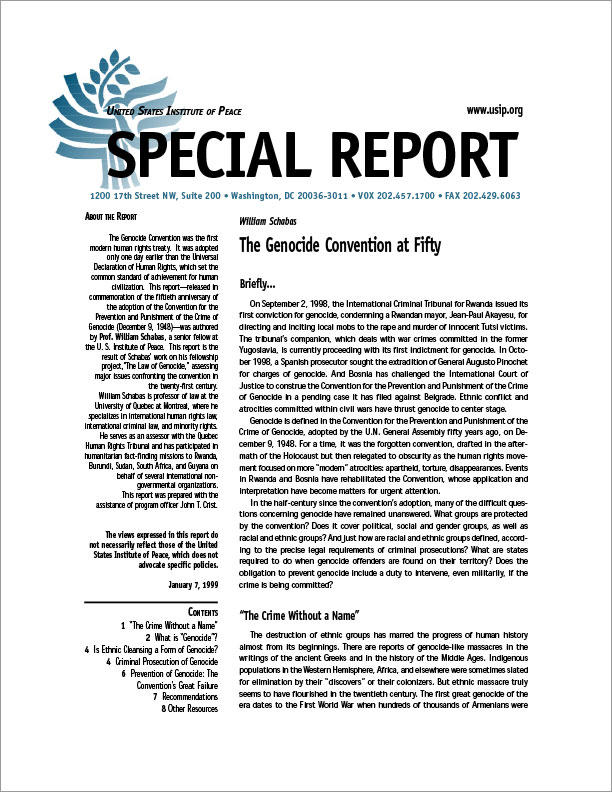
Summary
On September 2, 1998, the International Criminal Tribunal for Rwanda issued its first conviction for genocide, condemning a Rwandan mayor, Jean-Paul Akayesu, for directing and inciting local mobs to the rape and murder of innocent Tutsi victims. The tribunal's companion, which deals with war crimes committed in the former Yugoslavia, is currently proceeding with its first indictment for genocide. In October 1998, a Spanish prosecutor sought the extradition of General Augusto Pinochet for charges of genocide. And Bosnia has challenged the International Court of Justice to construe the Convention for the Prevention and Punishment of the Crime of Genocide in a pending case it has filed against Belgrade. Ethnic conflict and atrocities committed within civil wars have thrust genocide to center stage.
Genocide is defined in the Convention for the Prevention and Punishment of the Crime of Genocide, adopted by the U.N. General Assembly fifty years ago, on December 9, 1948. For a time, it was the forgotten convention, drafted in the aftermath of the Holocaust but then relegated to obscurity as the human rights movement focused on more "modern" atrocities: apartheid, torture, disappearances. Events in Rwanda and Bosnia have rehabilitated the Convention, whose application and interpretation have become matters for urgent attention.
In the half-century since the convention's adoption, many of the difficult questions concerning genocide have remained unanswered. What groups are protected by the convention? Does it cover political, social and gender groups, as well as racial and ethnic groups? And just how are racial and ethnic groups defined, according to the precise legal requirements of criminal prosecutions? What are states required to do when genocide offenders are found on their territory? Does the obligation to prevent genocide include a duty to intervene, even militarily, if the crime is being committed?
About the Report
The Genocide Convention was the first modern human rights treaty. It was adopted only one day earlier than the Universal Declaration of Human Rights, which set the common standard of achievement for human civilization. This report, released in commemoration of the fiftieth anniversary of the adoption of the Convention for the Prevention and Punishment of the Crime of Genocide (December 9, 1948), was authored by Prof. William Schabas, a senior fellow at the U. S. Institute of Peace. This report is the result of Schabas's work on his fellowship project, "The Law of Genocide," assessing major issues confronting the convention in the twenty-first century.
William Schabas is professor of law at the University of Quebec at Montreal, where he specializes in international human rights law, international criminal law, and minority rights. He serves as an assessor with the Quebec Human Rights Tribunal and has participated in humanitarian fact-finding missions to Rwanda, Burundi, Sudan, South Africa, and Guyana on behalf of several international non-governmental organizations. This report was prepared with the assistance of program officer John T. Crist.